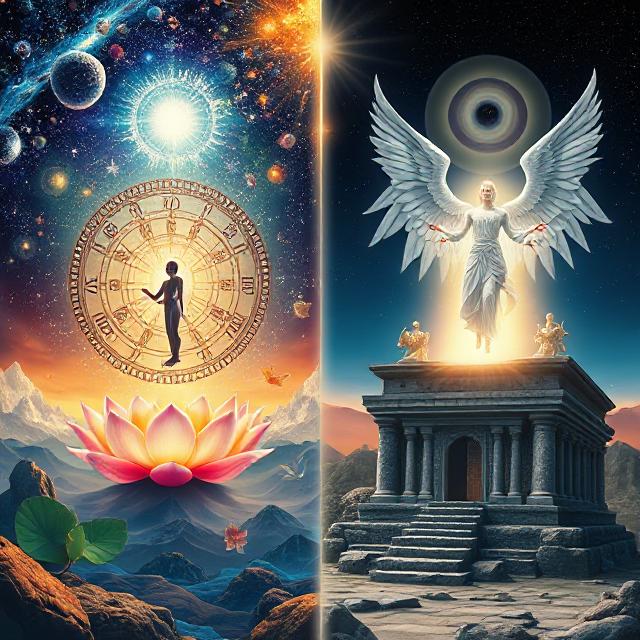
Table of Contents
Intuition vs Logic in Eastern vs Western Methods
Intuition vs logic in Eastern vs Western methods reflects a fundamental divergence in how human beings approach truth, knowledge, and problem-solving. While the West often privileges analytical reasoning, formal logic, and empirical verification, the East tends to emphasize intuition, holistic understanding, and experiential insight.
This comparison isn’t merely philosophical—it touches education, science, spirituality, and even politics. It reveals how different civilizations have come to define what it means to “know.”
I. Defining the Two Modes of Knowing
A. Logic: Analysis and Structure
In the Western tradition, logic is a systemized method for reaching truth.
- Based on deductive reasoning (Aristotle), where conclusions follow necessarily from premises.
- Developed into formal logic, symbolic reasoning, and mathematical proofs.
- Emphasizes clarity, non-contradiction, and step-by-step argumentation.
Logic seeks certainty through rigorous procedure. In Western education and science, this becomes the gold standard of knowledge.
B. Intuition: Insight and Wholeness
In the East, intuition refers to a direct, immediate grasp of truth:
- Often called prajna (Buddhism) or zhi (Confucianism/Daoism).
- Described as “knowing without thinking.”
- Arises through meditation, experience, and attunement, not analysis.
Where logic dissects, intuition integrates. Where logic proves, intuition perceives.
II. Logic in the Western Intellectual Tradition
A. Greek Roots: Plato and Aristotle
- Plato emphasized ideal forms and dialectical reasoning to discover truth.
- Aristotle codified formal logic: syllogisms, categories, causality.
This foundation shaped medieval scholasticism and later Enlightenment thought.
B. Enlightenment and Rationalism
Thinkers like Descartes, Spinoza, and Kant built entire systems based on rational principles.
- Descartes’ Cogito ergo sum is a rational proof of existence.
- Kant separated a priori (pure reason) and a posteriori (experience), placing reason at the center of moral law and metaphysics.
Western science and philosophy evolved with an emphasis on objectivity, skepticism, and falsifiability.
III. Intuition in Eastern Traditions
A. Daoism: Wu Wei and Natural Knowing
- Daoism embraces wu wei (effortless action), an intuitive flow with the Dao.
- Knowledge comes not from forceful reasoning, but harmony with nature.
- The Dao De Jing discourages over-reliance on words and definitions.
B. Zen Buddhism: Beyond Concepts
- Zen koans intentionally break logical patterns to prompt satori (sudden insight).
- Emphasis on direct experience, not scriptures or dialectics.
- Truth is apprehended in silence, not spoken or proven.
C. Confucianism: Moral Intuition
- While structured, Confucianism values innate moral sensibility (ren).
- Wisdom arises through reflection and cultivated empathy, not strict logical deduction.
IV. Applications in Modern Life
A. Education
- Western schools prioritize analytical thinking, standardized testing, and logical argument.
- Eastern systems (especially traditional ones) integrate memorization, imitation, and experiential learning—with a spiritual or moral core.
B. Science and Innovation
- Western science advances through hypothesis, experiment, and revision.
- Eastern medicine, such as Traditional Chinese Medicine or Ayurveda, relies on balance, cycles, and intuitive diagnostics.
C. Leadership and Strategy
- Western leaders tend to value strategic planning and linear problem-solving.
- Eastern thinkers (e.g., Sun Tzu in The Art of War) emphasize fluidity, adaptation, and indirect approaches.
V. Critiques and Misunderstandings
A. Over-Stereotyping
- East is not anti-logic: Buddhist logic schools (e.g., Dignaga, Dharmakirti) are rigorous.
- West is not anti-intuition: thinkers like Bergson, Kierkegaard, and Jung championed intuitive knowledge.
B. Complementarity
- Intuition and logic aren’t mutually exclusive.
- Science often advances through intuition (e.g., Einstein’s thought experiments) and is verified through logic.
- Wisdom traditions balance feeling and form, vision and verification.
VI. Integrative Approaches
A. Eastern-Western Fusion in Psychology
- Carl Jung explored archetypes and the collective unconscious (intuitive).
- Cognitive-behavioral therapy is logic-based; mindfulness is intuitive.
B. Integral Philosophy
- Thinkers like Ken Wilber propose a synthesis of rational, emotional, and spiritual ways of knowing.
- Education reform increasingly values emotional intelligence, not just IQ.
C. Modern Spirituality and Science
- Neuroscience now studies intuition as a real cognitive process.
- Meditation enhances not only peace, but decision-making and perception.
Conclusion: Beyond Either/Or
The contrast of intuition vs logic in Eastern vs Western methods teaches us that truth has many doorways. Logic gives us clarity, consistency, and structure. Intuition opens us to depth, context, and immediacy.
Neither should dominate. Each is incomplete alone.
In a divided world, integrating the analytic mind with the intuitive heart may be the most enlightened path forward.
